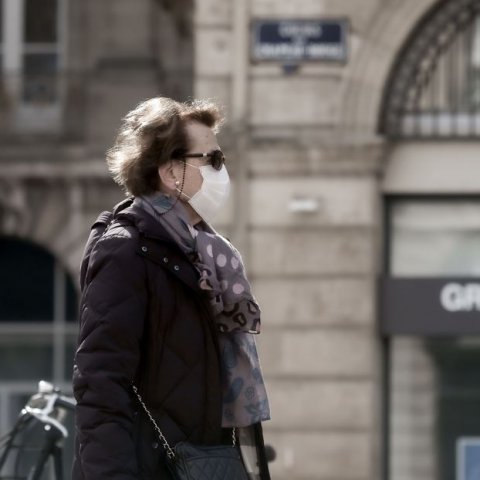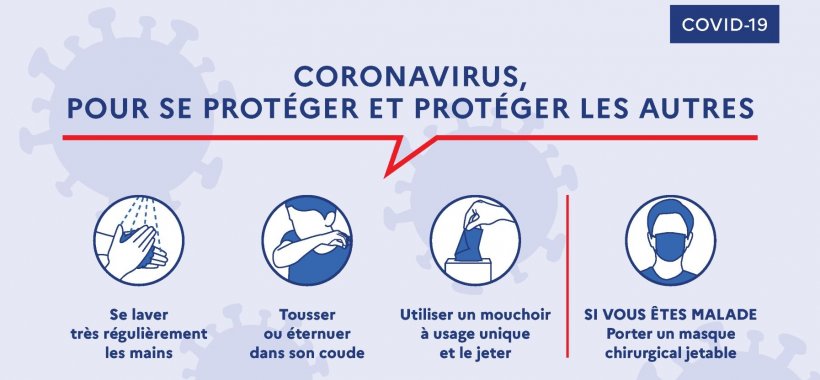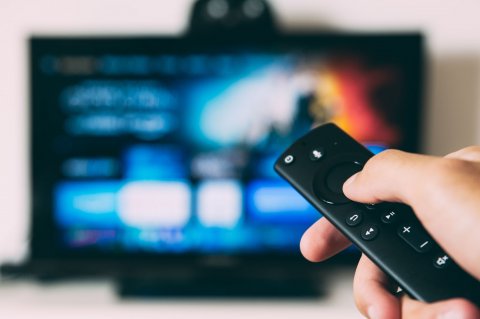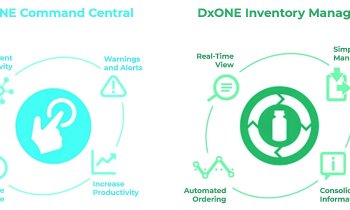News • Coping with Covid-19
How France handles the coronavirus pandemic
The first case of the new coronavirus infection was reported on the 24th January. As of 22nd March 2020, there are 14 459 confirmed cases of Covid-19 in France with 562 deaths, as the disease is in an exponential phase these figures will have multiplied several fold by the time this article is published.
Report: Jane MacDougall
The strategy taken by the French to stem the spread of the virus and relieve the pressure on the health service may seem draconian to some, but many feel that it is either not strong enough and/or too long in coming because it is only recently that the borders have finally been closed. Public information is widely available on the web and the health minister, Olivier Véran, holds a daily press conference (now with one journalist) to provide updates on the state of the epidemic and the evolution of the disease in France. Today, France is at stage 3 of the government’s plan to limit the spread of the virus.

Image source: Patrice CALATAYU from Bordeaux, France, COVID 19 (49684480041), CC BY-SA 2.0
For several weeks from the end of February, health officials had been advising social distancing, via a multi-media public health campaign which included radio, social media and television. Events were cancelled, museums closed and precautions such as frequent hand washing, not shaking hands etc. were introduced. After the closure of schools from the 16th March was announced, and closing all bars, restaurants, cinemas, ski stations from midnight on Saturday 14th, the French responded by partying in the spring sunshine in large groups of friends and families. Hence, from Tuesday 17th a blanket quarantine to stay at home is in place.
Leaving one’s residence is only permitted for purposes which include; essential work that cannot be done at home, for which written proof from the employer must be provided. Visits to a doctor or pharmacist, shopping for food, walking a dog or exercising alone are all permitted, providing an “Attestation de Déplacement Dérogatoire” downloaded from the internet, signed and dated is carried each time anyone wants to venture outside. These outings are limited to one per person a day alone, although children can accompany parents. Police controls have been reinforced and already after only 4 days, fines for breaking the “confinement” have been raised to 135 € from the original 35 € due to lack of compliance, if the payment is delayed (possible up to 40 days) then it rises to 375 €. On social media there are calls for this to be raised to 500 € and all fines collected be given to healthcare professionals and others who will have to continue working on the frontline throughout this crisis. Initially the quarantine is for 15 days but rumours abound that it will be extended to up to six weeks. It will certainly be reassessed at the end of the first 15 days to see the effect on the number of cases.

Image source: https://www.gouvernement.fr/info-coronavirus, Recommandatons gestes barrière Coronavirus France, marked as public domain
Separate channels of communication are in place for healthcare professionals. Heads of hospital groups were rapidly informed of the upcoming crisis and on the 13th February each local health authority was instructed to roll out the “ORSAN REB” plan in their regions. This involved following the 222 pages of the "Guide to prepare in order to reduce pressure on hospitals in face of exceptional public health situations”, to ensure each hospital was ready for the influx of patients. The health service is asking all HCPs who are currently not included on the list of actively working to join the health reserve, this list covers doctors with administration experience, emergency workers, anaesthetists, ICU specialists, emergency doctors, care workers with experience in ICU, nurses who are not working, nursing assistants and administration staff. The list of staff needed will change daily.
All non-essential operations have been postponed and specialist wards such as cardiology turned into ICU wards for Covid-19 patients. Outpatient appointments have been cancelled or postponed and patients are encouraged to use telemedicine apps and other online programmes to communicate with their GP or specialist.
Testing will be aided by a rapid test developed by the Institute Pasteur which has been available since the 27th January and gives a response in a few hours. Although drive-in testing is being piloted in Alsace, one of the most badly affected areas, as of this weekend testing is limited. The current strategy is to prioritise HCPs with symptoms, elderly people with symptoms, people with breathing difficulties, people with comorbidities, pregnant women, organ and tissue donors. To date, 60,000 tests have been performed, an average of 4000 per day.
In terms of treatment, the minister explained that he was in close contact with Prof Raoult in Marseille on the use of hydroxychloroquine. Prof Raoult’s team has had encouraging results in a small group of patients with this anti-malaria treatment. The authorities have rapidly advanced permission for his protocol to be tested in other hospitals and apparently the results are “very encouraging”. In 15 days’ time the results will be assessed to determine if this route is a viable option for treating Covid-19 patients and recommendations will be modified accordingly.

Image source: Unsplash/Glenn Carstens-Peters
Placing the general public in quarantine, as long as it is obeyed, should slow the spread of the disease and ease pressure of healthcare services and hospitals. Talking to doctors at the beginning of March and confirmed by several nurses, hospital visitors had been taking hand sanitizers and masks away with them after every visit. This had led to such items being kept under lock and key and severe nationwide shortages, especially of masks. For example a week ago, four nurses beginning a night shift found there were only two masks between them for the whole shift. The Minister for Health announced today that 250 million masks had been ordered and would be delivered progressively to the hospitals. As might be expected HCPs are already feeling the strain from a seemingly never ending stream of patients and having to triage patients regularly to ration the use of ventilators. Despite claims that this is a disease of the elderly 50% of the 1 560 patients in intensive care in France are under 60 years old and this includes one 40 year old hospital director.
Away from the hospitals, in general the spirits of those in quarantine seem high. New and existing apps are proving a life-line in keeping communication flowing. E-aperitifs and parties are planned by the most sociable while others can immerse themselves in on-line games, box sets, films, the encrypted television channel, Canal+, is now decrypted for everyone. For the more culturally inclined many museums have free virtual tours, the FNAC has made 500 e-books free for downloading and operas and plays are available on streaming. President Macon has a 51% popularity rating and 93% of people polled agree with his strategy. Early days but life is adapting rapidly to the overwhelming silence that pervades a country on “lockdown”.
23.03.2020










